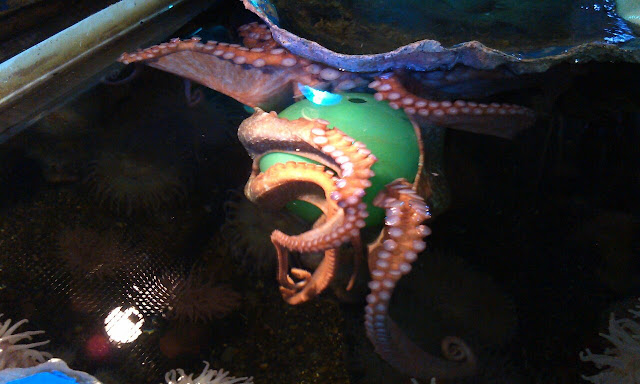Intelligence is a concept that has long fascinated humans, a phenomenon that has only been intensified by advancements in neuroscience. This is especially evident in the study of nonhuman intelligence and its biological origins, as researchers continue to uncover the impressive mental capabilities of several animal taxa, including primates, whales and birds. But the strangest of all of these may be the cephalopods, whose intelligence is so distinctive that some suggest they may be the closest we can get to approximating alien cognition.
What exactly makes these odd creatures so special? Cephalopods, a part of the phylum Mollusca, comprise over 800 species, including the well-known octopus, squid and cuttlefish. They come in all shapes and sizes, but their body plans generally involve a dome-shaped muscle called a mantle that covers their internal organs, two eyes and at least eight arms. Found exclusively in marine environments, all cephalopods are carnivorous, and some are extremely active and agile predators. Several are also known for their ability to change the color and texture of their skin, a characteristic that has fascinated people for millennia. But most notably, they are invertebrates, making their advanced cognition a particularly fascinating instance of convergent evolution, when similar traits evolve independently across lineages.

Above: A glimpse into the many cephalopod species found around the world. Image courtesy of The Guardian.
Beyond their unique biology, cephalopods play a vital role in marine ecology and human society. They are a critical component of the ocean food web, serving as both predators of fish and crustaceans and prey for larger animals such as whales, birds, and predatory fish. Additionally, they are an important food source in many cultures worldwide due to their abundance.
Cephalopod Cognition in Behavioral Studies
Much of our understanding of cephalopod cognition comes from behavioral studies. When investigating animal cognition, scientists often look for a few key features: problem-solving, good memory, and social communication. Behavioral experiments are then designed to test these skills, with a series of specialized tests that allow scientists to evaluate intelligence as it presents differently across species.
These behavioral experiments reveal the cephalopods’ capacity for complex problem-solving and rapid learning. Several studies demonstrate that octopuses and cuttlefish are capable of solving complex puzzles, such as navigating mazes, unscrewing jars and working through puzzle boxes to obtain a food reward. Importantly, their ability to master these tasks with increased speed and efficiency over repeated trials demonstrates a high capacity to learn.
Cephalopods also exhibit sophisticated intelligence through their use of tools. Some species carry coconut shells around and later use them as a defensive hiding spot when needed. Others assemble rocks around their den entrances for protection. Some even use sticks to poke unfamiliar objects.
Above: A veined octopus, Amphioctopus marginatus, carrying a coconut shell. Image courtesy of ABC News.

Aside from problem-solving and tool use, cephalopods demonstrate complex and abstract cognitive abilities. The most notable of these have been shown in the delay of gratification experiment, where, in a task adapted from one presented to human children, cuttlefish would refuse a less desirable meal of king prawn when they knew a tastier meal of shrimp was coming later. This self-control, which according to researchers can last up to 50-130 seconds, is comparable to that of other intelligent species like primates and birds. Cephalopods also have excellent memories. Captive octopuses, for instance, can recognize different humans and react accordingly, squirting water at specific people while remaining calm around others.
Cephalopods’ high intelligence is further shown in their display of highly individualized cognitive characteristics, which are akin to different personalities in humans. For example, performance on cognitive tasks varies between individuals; one study found that some octopuses are consistently reactive and fearful of new stimuli, while others are more proactive and curious about their surroundings. Additionally, observations made in aquariums and laboratories suggest that some octopuses like to play, indicating they can perform behaviors out of enjoyment rather than just a necessity for survival.
Above: An octopus at the New England Aquarium playing with a ball. Image courtesy of the New England Aquarium.

Although laboratory work shows plenty of evidence to support cephalopods’ advanced cognition, the instances that capture the most attention are the ones that occur outside of the well-controlled lab environment. Stories of octopuses escaping their enclosures in aquariums–even returning to the sea in some instances–and short-circuiting bothersome lights by squirting water at them garner widespread public fascination, further showcasing the remarkable intelligence of these animals.
What does Structural and Functional Neuroanatomy tell us?
Although the correlation isn’t always clear, studying an animal’s structural and functional neuroanatomy can provide insights into their intelligence and cognitive capabilities. Typically, intelligent animals possess high brain-to-body size ratios, a large number of neurons with high connectivity, and high degrees of compartmentalization. But these features can arise in vastly different forms, as is the case for cephalopods, given their extremely divergent path of evolution compared to most other intelligent animals.
Interestingly, whereas the nervous system of many intelligent animals features a centralized and integrated brain, cephalopods, although possessing a large brain, have relatively dispersed neurons grouped into components that show a high degree of functional autonomy. In fact, an octopus’s severed arm continues to behave as if it were still attached to the animal. A lack of myelin sheaths also means that several cephalopod species have extremely large neurons—the squid giant axon, a fiber involved in the water jet propulsion system, can grow up to 1.5mm in diameter!
These features are well-correlated with the high levels of cognition exhibited by cephalopods. In octopuses, their exceptional visual learning ability can be attributed to a large amount (120-180 million) of neurons devoted to visual processing. Despite being the smallest component of their nervous system, with only 45-50 million neurons, their brains are still highly organized, with some species having more than 30 differentiated lobes. Just as in vertebrates, the brain is responsible for integrating information, making high-level decisions, and controlling motor functions. Finally, and perhaps the most astonishingly, the peripheral nervous system (PNS) of the octopus possesses the most neurons—around 350 million! The PNS includes millions of sensory receptors, an axial nerve cord for sensory processing and motor control, and intramuscular nerve cords that help execute motor function.

Above: A diagram of the key features of the nervous system of the common octopus, Octopus vulgaris. Image courtesy of Imperadore et al. 2019.
But why did cephalopods evolve such advanced cognition? After all, they live a very antisocial and short life. One compelling hypothesis suggests that as cephalopods lost their protective shell retained by many other molluscs, advanced cognition gave cephalopods an advantage in outwitting predators. Another suggests that intelligence was a crucial tool in competing with fish—a highly successful group of marine predators. By developing these sophisticated cognitive and motor abilities, cephalopods could exploit new, challenging niches, giving them more opportunities for food with fewer competitors.
The Future of Cephalopod Cognition
Cephalopods continue to astonish researchers by performing more and more impressive cognitive feats. Still, their nervous system organization, vastly different from that of vertebrates, presents a fascinating challenge to the current paradigm of animal intelligence. The study of cephalopod cognition has an incredibly bright future—not just for the field of animal neuroscience, but for fields like robotics, artificial intelligence, and even philosophy.
The unique motor flexibility and anatomy of cephalopod limbs serve as an interesting source of inspiration for robotics and engineering. Scientists are already using flexible materials and suction cups inspired by octopus arms to build highly maneuverable machines with advanced grasping technologies. This approach, coupled with artificial intelligence modeled on the cephalopods’ distributed nervous system, could lead to the development of more agile and autonomous robots, capable of more complex tasks that require quick response to the environment.

Above: A robotic arm with suction cups to pick up objects, inspired by octopus limbs with high maneuverability and flexibility. Image courtesy of TechEBlog.
However, the advanced cognition of cephalopods raises some interesting ethical questions. Unlike most vertebrates, cephalopods are already granted some protections and limits regarding their use in laboratory work. While some argue these measures could impact science and research, others believe they are necessary given the animals’ high intelligence and ability to feel pain. As calls for protective legislation grow worldwide, this debate will only intensify, raising even broader questions about the ethical treatment of all invertebrates in science.
Finally, research on cephalopod cognition continues to stimulate discussions on the nature of consciousness and the concept of “other minds.” Consciousness, already a highly contested topic in philosophy of mind and neuroscience, has become even more complex with the discovery of the decentralized nervous systems of cephalopods. Their unique anatomy raises questions about how cephalopods may experience their inner lives, challenging conventional notions of consciousness being only relevant to humans and vertebrates. As research progresses, these discussions are set to only deepen, giving us much to consider when examining the nature of conscious experience and what it means to be truly intelligent.
